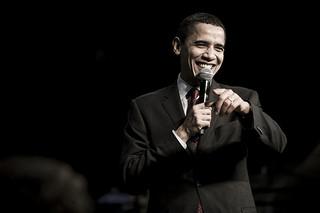One January night before his re-election campaign heated up, President Obama took the podium at the Apollo theatre in Harlem. He scanned the room and flashed his megawatt smile, prompting the crowd of 1,400 young professionals to cheer “Four More Years! Four More Years!” The president gave a shout out to the singers India.Arie and the Rev. Al Green. Then, channeling Green, Obama sang: “I’m so in love with you.” The crowd, predictably, went nuts.
His Apollo moment was more than a nice political touch. It was brilliant, a reminder that the man elected four years ago on the youthful promise of challenging the establishment was still there, and still human. The moment boosted Obama’s popularity at the start of what’s proven to be a surprisingly brutal election year.

Joe Crimmings Photography/Flickr
This election should be the incumbent president’s to lose. He’s been given a fabulous gift: Mitt Romney, a GOP nominee even the most loyal Republicans are openly wishing would just go away. For nearly all Americans, the economy is Topic A, and there’s an undeniable anxiety about the future. But the former Massachusetts governor and Bain capitalist can’t seem to connect with the masses. So while Obama’s leading in the polls, it’s mystifying that he isn’t doing even better.
At the recent Denver debate, though neither candidate was inspiring, Obama came across as shockingly passive, unable to explain and defend his own policies on the economy, health care, and education. The professor was outmatched by the consultant.
Part of Obama’s problem isn’t so different from what happens to many charismatic young people whose big ideas propel them to leadership: They lose a certain ability to connect. They become a manager, far too measured. They can’t rock the boat too much.
This is an especially tricky thing for a politician whose mystique is all about balances — between white and black, American, Kenyan and Indonesian, Ivy League and Chicago’s South Side.
Can President Obama get his groove back?
It’s hard to please everybody. It’s worth nothing that Obama has delivered to many key parts of his base. For so long, gays held our breath and figured he’d wait for a second term to repeal Don’t Ask, Don’t Tell, and move the needle on the same-sex marriage debate. But his administration swept away Don’t Ask, Don’t Tell more than a year ago and last spring, Obama came out in favor of gay marriage.
Immigrant rights advocates, particularly Latinos, weren’t counting on Obama to halt the deportation of many young undocumented immigrants. But he’s still leaving out one key part of this base: his most loyal supporters, African Americans.
That’s where Obama should turn to really get his groove back. His presidency comes at a moment when the black middle class is vanishing. The black unemployment rate is nearly 14 percent, far above the national average, and the wealth gap between whites and blacks is widening. Hardly anyone is talking about this in a meaningful way. If Obama were to bluntly acknowledge this, he’d puncture the popular perception that he’s moved too far away — that we just don’t know him anymore.
Blacks are in a bind. “If we had a white president, we’d be marching around the White House” demanding solutions, Rep. Emanuel Cleaver II, a Missouri Democrat who chairs the Congressional Black Caucus, recently said. Instead, black voters are conflicted — and effectively giving our first African-American president a pass.
One way to start reconnecting with black voters would be for Obama to say, in explicit terms, how his broad policies — say, health care — have helped African Americans. It’s hard to say what, precisely, government should do about the economic crisis that the numbers show is disproportionately hurting blacks. But the truth is this: Our country can’t afford to have such a large subset of the population fall into the abyss.
There’s no doubt blacks will make up a sizable share of Obama’s support next month. So we have every right to expect, and demand, that if Obama wins a second term, he stimulate a meaningful conversation about how to save the American middle class — especially the black middle class.